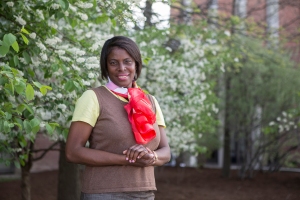Dr. Anne C. Bailey is a Jamaican-born academic – an author, writer and historian. She is Professor of History and Africana Studies at the State University of New York (SUNY) Binghamton. She still maintains close links with Jamaica; we first met when she visited Jamaica during Black History Month. I had the honour of organising her visit to Jamaica funded by the U.S. State Department, and I recall that she was introduced at a speaking engagement on her book African Voices of the Atlantic Slave Trade (published in 2006) by the late Professor Rex Nettleford. It was a memorable evening. I wrote about Anne here.

Here is a post from Anne Bailey’s blog about her new publication, now out. The link to this blog post is here.
My new book, The Weeping Time: Memory and the Largest Slave Auction in American History, is now available for advance purchase on Amazon. After ten long years, it will see the light of day this fall. A big thank you to all who made this possible. From time to time, I will share excerpts on this blog with particular attention as to why memory of this period matters.
The book is about the largest slave auction in U.S. history, which took place in Savannah, Georgia in 1859. In the book, I analyze the operation of the auction and trace the lives of slaves before, during, and after their sale. The personal papers of the Butlers, accounts from journalists that witnessed the auction, genealogical records, and oral histories help bring the auction to life. Demonstrating the resilience of African American families, the book also includes interviews from the living descendants of slaves sold on the auction block, showing how the memories of slavery have shaped their lives today.
Here’s an excerpt from the beginning of the book:
On March 2 and 3, 1859, Pierce Butler of the Butler Plantation estates in the Georgia Sea Islands sold 436 men, women and children, including thirty babies to buyers and speculators from New York to Louisiana. It was the largest recorded slave auction in U.S. history. The sale had been advertised for weeks in newspapers and magazines all across the country. The Savannah Tenbroeck Racetrack was the venue, three miles shy of the city. Eager potential buyers filled every hotel in Savannah. The two-day auction netted for the highly indebted Butler $303, 850, a phenomenal sum. On the eve of the Civil War, this unprecedented sale was noteworthy not only for its size but because of the fact that Butler plantation slaves had generally not been sold on the open market. These men and women had settled lives on Butler’s estates. Their lives as slaves were difficult and burdensome to be sure, but together they had formed a community with its own norms, values and customs – some of which were informed by their African heritage. Now they were displaced from their “home,” and separated from their families. It is for this reason the slaves called this auction, “The Weeping Time.”
In 1859, these men, women and children were sold, and a new chapter of their families’ stories began. Immediately upon Emancipation in 1863, some of these newly freed slaves set out on foot flocking to plantations all over the south searching earnestly for their loved ones. The only mementos they likely had were memories of their last meeting – on the auction block. They pursued every avenue in search of those whom they had lost. In some very special cases, they found each other. Others remained in the communities of their masters, bought property, worked the land and built new lives for themselves.
This is their story.
Anne C. Bailey
Pre-purchase on AMAZON here: The Weeping Time: Memory and the Largest Slave Auction in American History (Cambridge University Press, 2017)
email: freedomlives4@yahoo.com
personal website: https://www.annecbailey.net
How are you? Find your articles very informative I am the Author of Death Atonement Tears I can send you a eBook of my book for your perusal
LikeLike
It is always refreshing to get new insight on our history that was not easily accessible until the advent of electronic media. Thanks for sharing this information, so we can access more information and enhance our knowledge. I have an article which I researched on Alexander Bedward – “Genesis of a Jamaican Messiah”.
LikeLike
Yes! History is about people, and their stories. There are always more stories to discover, aren’t there!
LikeLike
Emma!! Thanks for sharing this very important publication. A timely reminder of the enduring links between enslaved African women and men, and their descendants everywhere. Judith
LikeLike
Thanks, Judith. Yes, it is most important to make those connections. The enslaved women, and their families…
LikeLike